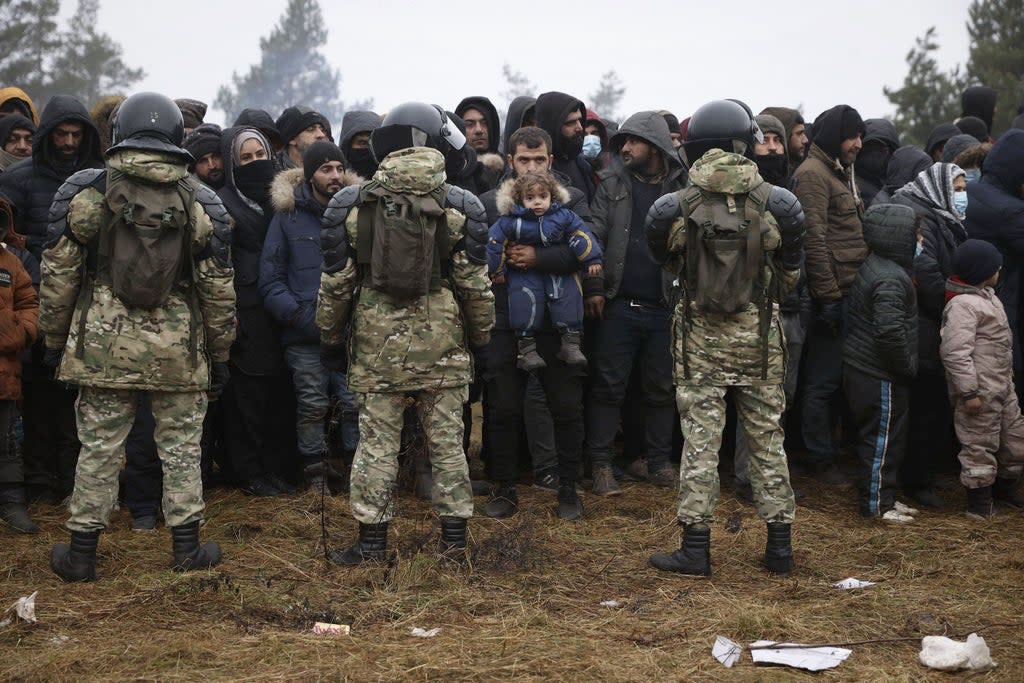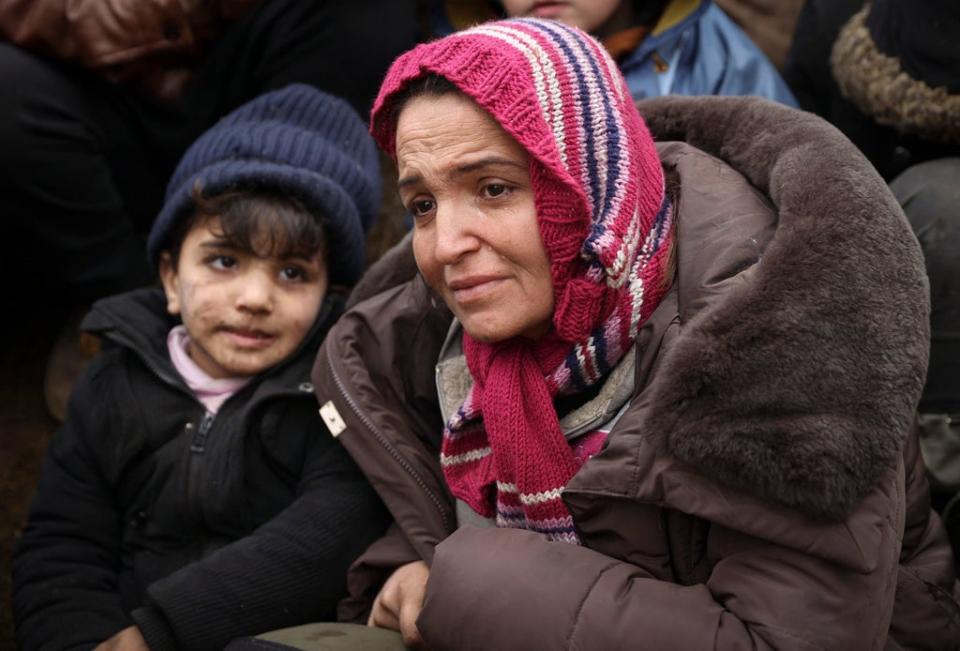Poland tells desperate migrants not to believe rumours promising safe route to Germany

Rumours that have been circulating among desperate migrants packed on the Poland-Belarus border of a safe corridor to Germany opening on Monday have been countered by the government in Warsaw.
A message, which was sent to all phones in the border area with a foreign number, read: “Poland won’t let migrants pass to Germany. It will protect its border. Don’t get fooled, don’t try to take any action.”
The message was sent as a tense stand-off continued between Polish border guards and their Belarusian counterparts, who earlier had allegedly attempted to breach a part of the temporary border fence in order to clear a path for migrants to cross.
Polish forces said migrants were receiving instructions and equipment from Belarusian guards, and that they expected another “big attempt” to break through.
“Huge logs of wood are being brought in, probably to lower the fence,” Border Guard spokesperson Katarzyna Zdanowicz told private broadcaster TVN24.
Polish authorities have so far registered 223 attempts to cross the border and said they expected another big push in the coming days.
One man waiting for entry into Poland, who requested anonymity, told The Independent that the rumours of safe passage to Germany had lifted the mood in the camp.
“We are waiting [for] after the 15th [of November] and waiting for permission specially… I hope everything will be fine,” he said in a WhatsApp message.
Over 2,000 people are still gathered along the Belarusian side of the border with the European Union.
Brussels has accused Belarus of provoking the crisis in an effort to undermine the EU’s security – a claim denied by Minsk – amid warnings that the crisis could descend into a military conflict. The EU has threatened fresh sanctions against Lukashenko and his regime from as early as this week, and has said the bloc would jointly finance a border wall.
On Sunday, Poland’s prime minister Mateusz Morawiecki called for “concrete steps” to be taken by Nato and neighbouring countries to resolve the crisis. Russian president Vladimir Putin, a key backer of Belarus’s leader Alexander Lukashenko, said Moscow was ready to help bring about a resolution.
With temperatures plummeting at night to around -3C, the migrants, who are camped out under makeshift shelters, are becoming desperate. Videos released by Belarusian security forces show people scrambling for food and arguing over blankets.
Despite Poland’s best efforts to prevent people from crossing, many are making it through every week. It’s a perilous journey through the dense forests that separate the two countries, and those who are caught by Polish border guards are often pushed back, contrary to international rules on asylum.
But countering the authorities’ hostility are local Poles in the forest, who have worked with activists to ensure that anyone picked up by them is given first aid, food, warm clothes and legal assistance.
One of them, Oliwia Hurley, lives just outside the village of Bialowieza, and has been involved in the local relief effort for more than ten weeks – something she describes as an underground system of aid.
“I’m shocked about how things are handled here”, she told The Independent, referring to Poland’s hardline stance on migration. “When it [the crisis] started … we never thought in our wildest dreams how it would evolve and how we were going to be involved.”
When people cross the border they are always afraid of getting caught, and often they haven’t eaten in days. Within the forests there are also several swampy areas that migrants have to wade through, soaking their clothes and shoes.

When locals spot them, they immediately click into action, activating the aid network and getting in touch with the activists based outside the exclusion zone.
“Many of them have no idea where they are geographically. They sometimes think over the forest is Germany, or another western country that they heard about or have relatives in. They don’t know much about Poland or what sort of forest they are facing. This isn’t any common little forest, this is the last primeval forest of Europe, and the terrain is difficult,” said Oliwia.
The last few weeks have not just affected the local volunteers but also their families. Oliwia’s daughter is aware that there are people in the forest who need help, but the seven-year-old struggles to come to terms with the fact that many of them are children like her. “She really struggles with understanding how anyone can allow for children to suffer like that in the forest,” said her mother.
It’s not just the thought of people from foreign lands in the forest that is scaring the local children. With over 12,000 Polish troops stationed at the border, the heavy military presence has also contributed to their fear.
“People with long machine guns are everywhere. We stop at checkpoints where there are masked men who come to our car to ask questions with guns in their hands,” said Oliwia.
“All of this has impacted our children. When they draw pictures now, they draw checkpoints and tanks and army lorries. These are all very subtle changes, but the kids instinctively know that what’s going on is not good.”
Read More
Liz Truss calls on Putin to intervene in Belarus migrant crisis
Syrian man found dead on Polish border with Belarus
Teenage boy dies in freezing conditions on Poland-Belarus border
Belarusian border crisis will only add to tensions within Europe
China decree cements President Xi’s power and place in history
Nazis on the beach: How Spain’s Costa Blanca was a safe haven for SS officers


